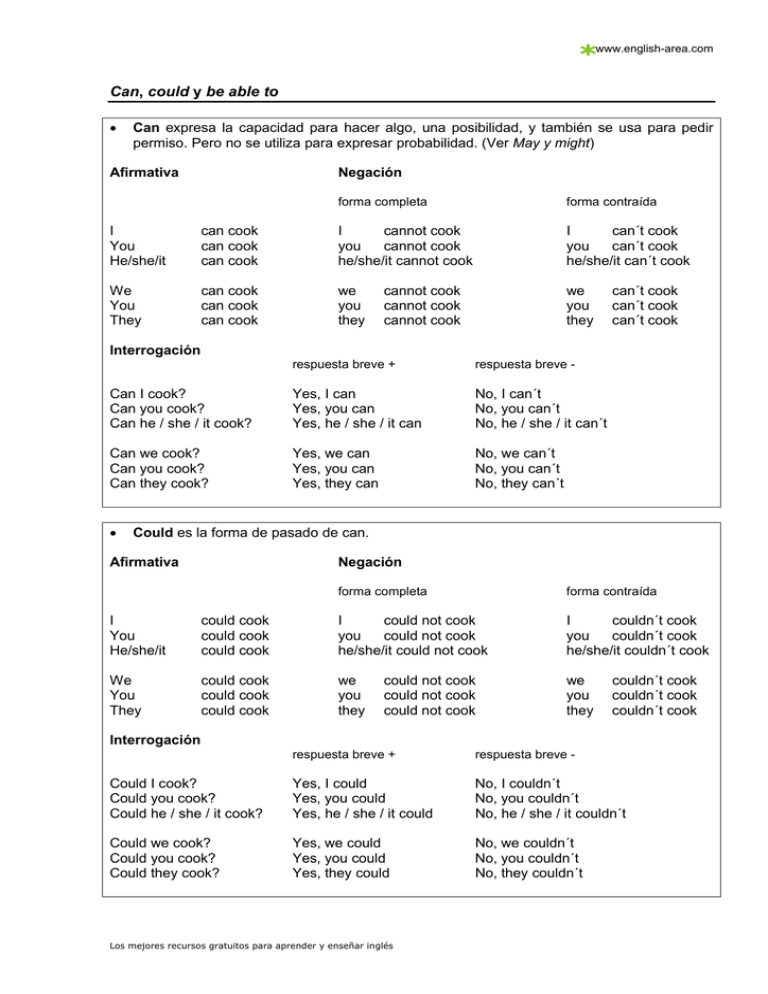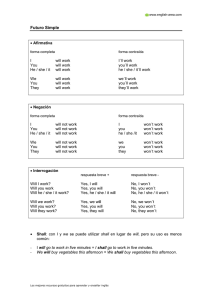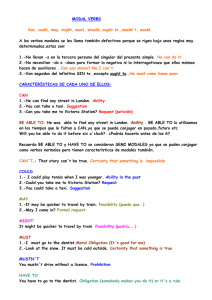Teoría can, could, be able to
Anuncio

www.english-area.com Can, could y be able to • Can expresa la capacidad para hacer algo, una posibilidad, y también se usa para pedir permiso. Pero no se utiliza para expresar probabilidad. (Ver May y might) Afirmativa Negación forma completa forma contraída I You He/she/it can cook can cook can cook I cannot cook you cannot cook he/she/it cannot cook I can´t cook you can´t cook he/she/it can´t cook We You They can cook can cook can cook we you they we you they cannot cook cannot cook cannot cook can´t cook can´t cook can´t cook Interrogación respuesta breve + respuesta breve - Can I cook? Can you cook? Can he / she / it cook? Yes, I can Yes, you can Yes, he / she / it can No, I can´t No, you can´t No, he / she / it can´t Can we cook? Can you cook? Can they cook? Yes, we can Yes, you can Yes, they can No, we can´t No, you can´t No, they can´t • Could es la forma de pasado de can. Afirmativa Negación forma completa forma contraída I You He/she/it could cook could cook could cook I could not cook you could not cook he/she/it could not cook I couldn´t cook you couldn´t cook he/she/it couldn´t cook We You They could cook could cook could cook we you they we you they could not cook could not cook could not cook couldn´t cook couldn´t cook couldn´t cook Interrogación respuesta breve + respuesta breve - Could I cook? Could you cook? Could he / she / it cook? Yes, I could Yes, you could Yes, he / she / it could No, I couldn´t No, you couldn´t No, he / she / it couldn´t Could we cook? Could you cook? Could they cook? Yes, we could Yes, you could Yes, they could No, we couldn´t No, you couldn´t No, they couldn´t Los mejores recursos gratuitos para aprender y enseñar inglés www.english-area.com Should y ought to • Should y ought to se utilizan para dar consejos, hablar de responsabilidades o probabilidad. Recuerda que should jamás va seguido ni precedido de to. Afirmativa I You He/she/it should / ought to work should / ought to work should / ought to work We You They should / ought to work should / ought to work should / ought to work Negativa forma completa forma contraida I You He/she/it should not / ought not to work should not / ought not to work should not / ought not to work I shouldn´t / oughtn´t to you shouldn´t / oughtn´t to he/she/it shouldn´t / oughtn´t to We You They should not / ought not to work should not / ought not to work should not / ought not to work we shouldn´t / oughtn´t to you shouldn´t / oughtn´t to they shouldn´t / oughtn´t to Interrogación respuesta breve + respuesta breve - Should / ought I to work? Should / ought you to work? Should / ought he/she/it to work? Yes, I should /ought to. No, I shouldn´t / oughtn´t to Yes, you should /ought to No, you shouldn´t / oughtn´t to Yes, he/she/it should /ought to No, he/she/it shouldn´t / oughtn´t to Should / ought we to work? Should / ought you to work? Should / ought they to work? Yes, we should /ought to Yes, you should /ought to Yes, they should /ought to No, we shouldn´t / oughtn´t to No, you shouldn´t / oughtn´t to No, they shouldn´t / oughtn´t to • Should y ought to en pasado: estos verbos no tienen una forma propia de pasado. Su forma no cambia, pero sí se pone el infinito que les acompaña en tiempo perfecto : have + participio. Ejemplos: - You should have eaten more for breakfast. - They ought to have arrived earlier. - I should have told them the truth. Los mejores recursos gratuitos para aprender y enseñar inglés www.english-area.com • Consejos: should y ought to equivalen en español a debería + infinitivo. Ejemplos: - You should / ought to eat less fat. They should / ought to be more careful about what they say. You should / ought to come with me to the party. It will be fun. She shouldn´t / oughtn´t to be so rude. • Responsabilidades: should y ought to también expresan algo que se debería hacer o haber hecho. Ejemplos: - I should / ought to be early tomorrow because I´ve got lots to do at work. We should / ought to save some money. I should / ought to have known all the answers to the test. It was so easy! • Probabilidad: estos verbos pueden expresar algo que debería ser cierto. Ejemplos: A: I can´t find the keys. B: Well, they should / ought to be in the first drawer. - They said on TV that it would be sunny for a couple of days, so it shouldn´t / oughtn´t to rain yet. This film should / ought to be good. All the actors in it are very popular. Los mejores recursos gratuitos para aprender y enseñar inglés www.english-area.com Mustn´t Mustn´t se utiliza para expresar prohibición. Al igual que must, va seguido de un infinitivo sin to: - I mustn´t be late for dinner. - You mustn´t walk on the grass. - He mustn´t go out without telling his parents. - We musn´t talk during the exam. - You mustn´t tell anyone. - They mustn´t eat chocolate. La forma no contraida es must not Los mejores recursos gratuitos para aprender y enseñar inglés www.english-area.com Must, have to y don´t have to • Must es un verbo modal que expresa la obligación de hacer algo. Como todos los modales, va seguido de otro infinitivo sin “to”. Afirmativa I You He/she/it must work must work must work We You They must work must work must work Interrogación respuesta breve + respuesta breve - Must I work? Must you work? Must he / she / it work? Yes, I must Yes, you must Yes, he / she / it must No, I mustn´t No, you mustn´t No, he / she / it mustn´t Must we work? Must you work? Must they work? Yes, we must Yes, you must Yes, they must No, we mustn´t No, you mustn´t No, they mustn´t Negación: Mustn´t está explicado en otro apartado de los Verbos Modales, por la diferencia de significado con must. • Must también se utiliza para expresar una conclusión: - The light is on. He must be at home. - It´s very windy and cloudy. It must be cold. - He´s got a lot of white hair. He must be over 40. - There´re pieces of glass on the road. There must have been an accident. - Must sólo tiene forma de presente. Por ello, para cualquier otro tiempo se utiliza have to: - I´ll have to work next Sunday. - She had to clean all the house. • Have to indica obligación, al igual que must. Afirmativa I You He/she/it have to work have to work has to work we you they Los mejores recursos gratuitos para aprender y enseñar inglés have to work have to work have to work www.english-area.com Interrogación respuesta breve + respuesta breve - Do I have to work? Do you have to work? Does he / she / it have to work? Yes, I do Yes, you do Yes, he / she / it does No, I don´t No, you don´t No, he / she / it doesn´t Do we have to work? Do you have to work? Do they have to work? Yes, we do Yes, you do Yes, they do No, we don´t No, you don´t No, they don´t - También puede utilizarse have got to, que es algo más informal. • Existe una pequeña diferencia de significado entre must y have to: Must indica una obligación que se impone uno mismo, más que las circunstancias: - I must study for the exam. - He must work more to have enough money. Have to, en cambio, expresa una necesidad impuesta por las circunstancias externas: - She has to get up at 7 every morning. - We have to work till 6 on Mondays. • Don´t have to expresa que no es necesario u obligatorio hacer algo. forma completa forma contraída I do not have to work You do not have to work He/she/it does not have to work I don´t have to work you don´t have to work he/she/it doesn´t have to work We do not have to work You do not have to work They do not have to work we you they don´t have to work don´t have to work don´t have to work Ejemplos: - You don´t have to do the shopping. I´ll do it tomorrow. - I don´t have to go to school at weekends. - They don´t have to wash by hand because they´ve got a washing machine. Los mejores recursos gratuitos para aprender y enseñar inglés www.english-area.com Ejemplos: - When I was young I could run very fast, but now I can´t - I could walk when I was ten months old. - Paul can´t cook. His meals are terrible. - I can drive, but Sarah can´t. • Be able to tiene un significado similar a can/could, pero suele utilizarse para expresar la habilidad de hacer algo de cierta dificultad (en español equivale a “ser capaz de”): I can walk very fast They were able to escape from the fire. She could draw very well at 10. When she was five, she was able to draw wonderful pictures. - También se utiliza en lugar de can en el futuro, ya que can no tiene una forma para ese tiempo: I can/could find that street → I´ll be able to find that street. - Otros casos en los que se utiliza be able to, y no can, es cuando tiene que ir seguido de un infinitivo con to o una forma en –ing, ya que can/could sólo puede ir seguido de un infinitivo sin to. We were very happy to be able to be there (no We were very happy to can to be there*) I have to be able to run the marathon (no I have to can.....*) Sujeto + verbo to be (en cualquier tiempo) + to + infinitivo Los mejores recursos gratuitos para aprender y enseñar inglés

